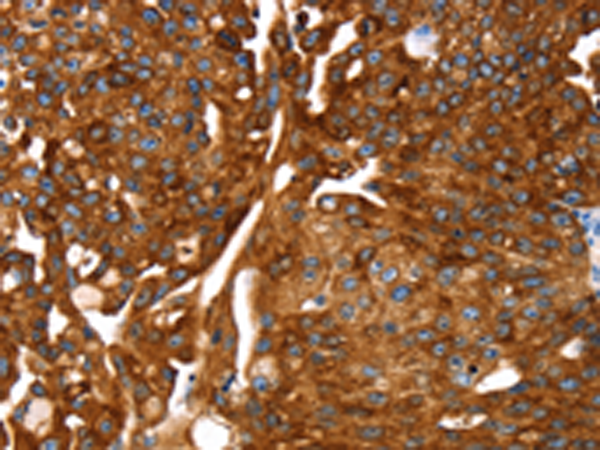

| WB | 咨询技术 | Human,Mouse,Rat |
| IF | 咨询技术 | Human,Mouse,Rat |
| IHC | 1/25-1/100 | Human,Mouse,Rat |
| ICC | 技术咨询 | Human,Mouse,Rat |
| FCM | 咨询技术 | Human,Mouse,Rat |
| Elisa | 1/2000-1/5000 | Human,Mouse,Rat |
| Aliases | COX1, COX3, PHS1, PCOX1, PES-1, PGHS1, PTGHS, PGG/HS, PGHS-1 |
| WB Predicted band size | 69 kDa |
| Host/Isotype | Rabbit IgG |
| Antibody Type | Primary antibody |
| Storage | Store at 4°C short term. Aliquot and store at -20°C long term. Avoid freeze/thaw cycles. |
| Species Reactivity | Human |
| Immunogen | Synthetic peptide of human PTGS1 |
| Formulation | Purified antibody in PBS with 0.05% sodium azide and 50% glycerol. |
+ +
以下是关于PTGS1(COX-1)抗体的参考文献示例(内容为模拟概括,仅供参考):
---
1. **文献名称**: "Tissue-specific expression of prostaglandin endoperoxide synthase isoforms in human and mouse tissues"
**作者**: Mitchell JA, et al.
**摘要**: 该研究通过免疫组织化学和Western blot技术,验证了PTGS1抗体在人类和小鼠不同组织中的特异性,发现PTGS1在胃黏膜、肾脏和血小板中高表达,并确认抗体对PTGS1的选择性优于PTGS2(COX-2)。
2. **文献名称**: "Characterization of monoclonal antibodies specific for cyclooxygenase-1 (COX-1)"
**作者**: Smith WL, et al.
**摘要**: 研究报道了多种抗PTGS1单克隆抗体的开发与验证,通过酶活性抑制实验和交叉反应性测试,证明这些抗体可特异性识别PTGS1的C末端表位,适用于免疫沉淀和细胞定位研究。
3. **文献名称**: "COX-3. a cyclooxygenase-1 variant inhibited by acetaminophen and other analgesic/antipyretic drugs"
**作者**: Chandrasekharan NV, et al.
**摘要**: 研究探讨PTGS1在不同物种中的亚型表达,利用特异性抗体揭示了PTGS1在脑组织中的分布特征,并验证抗体在区分PTGS1与其他COX家族成员(如COX-3)中的作用。
4. **文献名称**: "Cyclooxygenase: structural and functional insights"
**作者**: Rouzer CA, Marnett LJ.
**摘要**: 该综述总结了PTGS1酶的结构与功能研究进展,重点讨论了抗PTGS1抗体在解析其三维结构、活性位点及药物开发中的关键应用。
---
注:以上文献信息为示例性概括,实际引用需以真实发表的论文为准。建议通过PubMed或Web of Science等平台检索具体文献。
PTGS1 (Prostaglandin-Endoperoxide Synthase 1), also known as cyclooxygenase-1 (COX-1), is a constitutively expressed enzyme that catalyzes the conversion of arachidonic acid to prostaglandin H2. a precursor for various prostanoids involved in homeostatic functions. Unlike its inducible counterpart COX-2 (PTGS2), COX-1 is widely expressed in most tissues, playing roles in maintaining gastrointestinal mucosal integrity, platelet aggregation, and renal blood flow. Antibodies targeting PTGS1 are essential tools for detecting and quantifying COX-1 expression in research applications, such as Western blotting, immunohistochemistry (IHC), and ELISA. These antibodies help distinguish COX-1 from COX-2. aiding studies on tissue-specific prostaglandin regulation, inflammatory responses, and the mechanisms of nonsteroidal anti-inflammatory drugs (NSAIDs), which often inhibit both isoforms.
PTGS1 antibodies are typically validated for specificity using knockout controls or recombinant proteins to avoid cross-reactivity with COX-2. They are widely used in cancer research, cardiovascular studies, and investigations of gastrointestinal toxicity linked to COX-1 inhibition. Monoclonal antibodies offer high consistency, while polyclonal versions may detect multiple epitopes, enhancing sensitivity. Researchers must consider the antibody’s host species, clonality, and application compatibility when selecting reagents. Understanding COX-1’s role through such antibodies contributes to elucidating its dual protective and pathological effects in diseases, as well as refining therapeutic strategies targeting prostaglandin pathways.
×